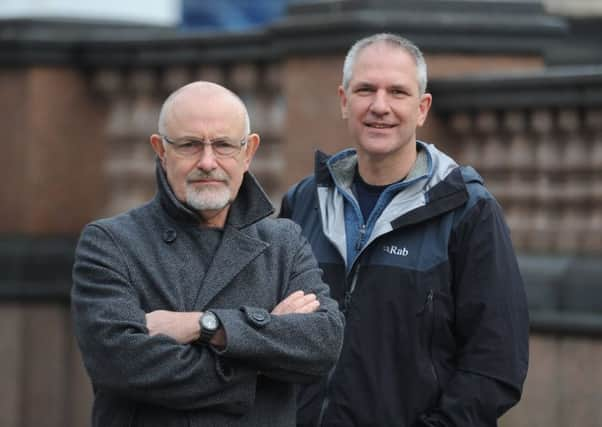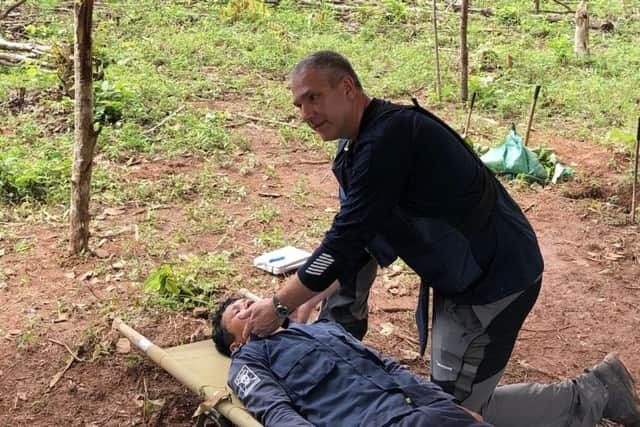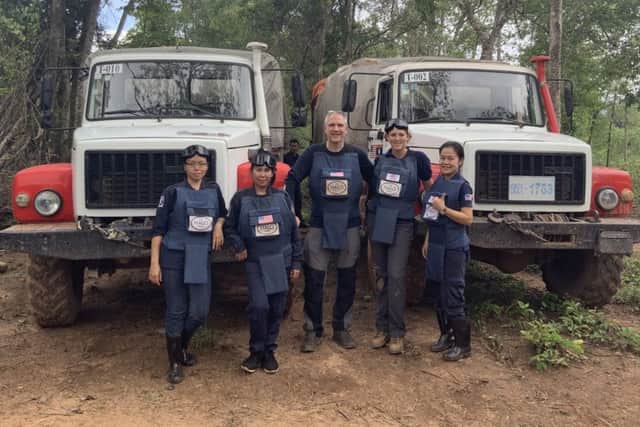Yorkshire medics clearing legacy of wars that maim and kill


Twenty-two years after Princess Diana walked through a minefield in Angola, her son, Prince Harry followed in her footsteps.
It was a powerful image, and according HALO, the charity tasked with clearing landmines, priceless in highlighting the continued threat posed by such devices.
Advertisement
Hide AdAdvertisement
Hide AdLandmines, cluster bombs and other explosives inflict appalling injuries that have a devastating impact on people’s futures. More than 7,200 people were killed or injured by landmines and other explosives in 2017 alone.


HALO protects lives by destroying landmines and teaching people, particularly children, how to stay safe until their work is done.
And while Prince Harry’s visit was welcome, it is the hundreds of people who give their time unpaid to try to make these war torn countries safe, that are saving lives.
Two of those volunteers are Dr Bob Marks and Steve Archer both from Yorkshire.


Advertisement
Hide AdAdvertisement
Hide AdThe men are involved in the training of locals to deal with medical emergencies in the field.
Some are already paramedics, but some are just ordinary members of the public, who want to help keep people safe from the man-made devices that continue to kill and maim, in particular children.
For Steve Archer it was seeing first hand the damage caused by mines and improvised explosive devices (IEDs) while with the army in Afghanistan that inspired him to volunteer for HALO once he left the Army.
“I have 30 years of military experience and have worked in a trauma hospital in Afghanistan. I saw children who had lost limbs. Having a young son of my own it really hit home and I knew I had to try to do something to help.”
Advertisement
Hide AdAdvertisement
Hide AdThe former Army officer and Registered Nurse, Steve has been a Nursing Director, Hospital Commander, Commander of Hospitals and currently is based in York.
He joined the HALO medical group in 2016 and since then he has provided medical assurance to teams disarming mine remnants from the Balkans conflict in Kosovo and overseen the training of 24 Ukrainian paramedics prior to their deployment to Eastern Ukraine, where there is a serious anti-personnel and anti-tank landmine crisis.
He has most recently returned from Laos, where HALO is clearing unexploded ordinance from the Vietnam War and provided environmental health advice relating to dengue fever and snake bites, as well as providing mine risk education to remote village communities.
“It isn’t just about training people to deal with trauma following an explosion. The most common incidents are road traffic accidents but we also have to train people to deal with things like scorpion bites,” explains Steve.
Advertisement
Hide AdAdvertisement
Hide Ad“We have to look at the environment people are working in and train them accordingly. There are so many different things. In Laos there is a tree that can bring about a really bad allergic reaction that can be quite severe.”
Dr Bob Marks is a retired GP and Emergency Medicine specialist who lives in Saltaire and will be the first medic to visit Halo’s new team who are clearing enormous amounts of bomb-damage in Libya.
HALO is one of the very few internationals NGOs operating in the country.
Bob will help rehearse life-saving scenarios with Halo’s newly qualified Libyan deminers there. Previously he has overseen medical procedures for our operations in Georgia, Abkhazia and Ivory Coast.
Advertisement
Hide AdAdvertisement
Hide Ad“We have to prepare them so that they know how to react in an emergency as response time is critical. It can be life or limb,” says Bob.
“We practise it so that it becomes second nature. It’s about teaching the guys about what is going to make a difference – it is practical training as opposed to theoretical training. It’s about teaching them to do the right thing that will make a difference in the majority of situations without bogging them down with too much theory.”
They normally only have two weeks to train the people and therefore Bob says they have to concentrate on the things that will make a difference in an emergency.
This can include how to control a haemorrhage, keeping airways open, breathing and circulation.
Advertisement
Hide AdAdvertisement
Hide AdIn many of the countries the men visit, language can also be an issue.
“We do have to use interpreters which can add another complication,” says Bob
There are still 60 million people around the world who are directly affected by landmines. Millions of factory-produced landmines laid in the late 20th century remain in the ground and still have the capacity to kill and maim.
Today homemade victim-initiated landmines or improvised explosive devices (IEDs) are increasingly being used in contemporary conflict.
Advertisement
Hide AdAdvertisement
Hide AdLibya poses a different challenge to many of the areas where HALO works, where demining is usually spread across fields. In Libya it is a much more urban problem, with IEDs hidden in houses and in areas which are often still populated by families.
This means children are particularly at risk and HALO tries to educate youngster on the risks.
But above all they work with the communities themselves.
“It is about helping the communities thrive, rather than just survive,” adds Steve.
HALO clears landmines, bombs and IEDs from over 25 countries around the world and has a global workforce of nearly 9,000 male and female deminers, who have been trained to clear mines safely and professionally.
Advertisement
Hide AdAdvertisement
Hide AdDespite the inherent dangers of the work, Halo has an outstanding safety record, thanks to a group of UK medics who volunteer their leave to visit minefields and ensure that the deminers are thoroughly trained in emergency paramedicine.
HALO is funded by various governments but also relies on donation from the publica.
Give before December 22 and all public donations to Breaking Boundaries will be doubled by the UK government.
www.halotrust.org/
